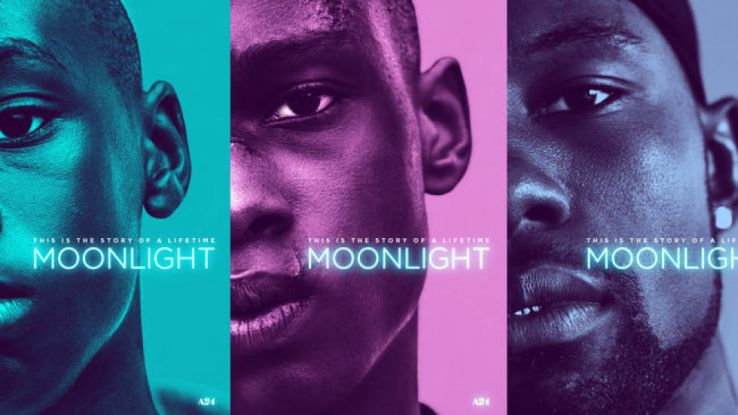
It’s odd how a film can stimulate involuntary, gut reactions — especially when those reactions are set up as an absolute challenge to one’s system of values.
In the third act of Barry Jenkins’ latest film, Moonlight, the audience is treated to the rewarding sight of a strong, independent man who doesn’t shrink in the face of animosity. This character, called ‘Black’(Trevante Rhodes), the oldest version of the film’s main protagonist, initially defies the shrivelling weakness of his two earlier iterations which also make up the names of the film’s parts: ‘Little’(Alex Hibbert) and ‘Chiron’(Ashton Sanders). He’s bearded, muscular, and handsome. He’s confident and imposing.
But what we’re actually seeing, despite how the film skips over the more damning parts of his daily life, is a man who grew up in such horrible conditions that he found hustling drugs to be his only way out. We see it related as strength and conviction: a stronger, more human version of the odd looking boy who could barely hold his head up in public or mutter more than three words.
his daily life, is a man who grew up in such horrible conditions that he found hustling drugs to be his only way out. We see it related as strength and conviction: a stronger, more human version of the odd looking boy who could barely hold his head up in public or mutter more than three words.
The film begins with an analogous sight: Juan(Mahershala Ali), a rock-pusher, kindly stepping above the dirt and the nitty-gritty associated with the industry. In a captivating opening scene with a long, spinning shot, we see his character watch the uncomfortable, messy exchange between a street urchin and a lower direct marketer. He smiles, looking on, a seemingly disconnected associate of that same world.
In scenes like this, the film depicts the reality of poor, black
communities in Miami without sensationalizing them. It’s the setting, informing this version of the human experience; it isn’t the plot.
Moonlight, at its core, is a love story about grappling with repressed, controversial feelings. It tackles the so common, seemingly contrary relationship between being truly alive and being truly in love.
 The powerfully portrayed, three dimensional humans are what make it work: Juan may be a drug
The powerfully portrayed, three dimensional humans are what make it work: Juan may be a drug
dealer, but that isn’t who he is. He’s kind; thoughtful; smart; realistic. We can see his hesitation, the relationship between his heart and his reality. He recognizes his faults and he tries to do good within them, all within the confines of his place in society, peddling drugs to whomever will buy them, including Chiron’s mother.
Chiron barely says more than a handful of sentences throughout the picture, but it’s the way that he says them, and the way that he carries himself, that defines his story. He’s the pivot of a hopeful, simple, representational bildungsroman that follows the energy of so many classic works of fiction by nullifying the more overt, general details of the protagonist in order to make room for the audience to insert themselves into his place.
Obviously, realizing oneself as a homosexual, black child is a challenge for the more supposedly ‘prestigious’ crowds that this sort of film is marketed towards. This creates a relational challenge that makes the film all the more powerful.
Where history and cinema align are generally independent, but in a lot of ways the release of Moonlight feels like an honest, natural response to the #OscarsSoWhite boycotts that took place earlier this year. It’s a film that utilizes an almost exclusively black cast within a diverse environment many viewers would never find themselves in, to create a general, relatable story of searching for one’s place in their own world. It expresses the universality in diversity.
of Moonlight feels like an honest, natural response to the #OscarsSoWhite boycotts that took place earlier this year. It’s a film that utilizes an almost exclusively black cast within a diverse environment many viewers would never find themselves in, to create a general, relatable story of searching for one’s place in their own world. It expresses the universality in diversity.
Moonlight is a subtle film about intimacy that boasts a slew of strong performances and especially evocative cinematography, transcending the understated nature of the deceptively simple script. It relates how a person’s societal path is created by their environment – not as an indictment of any system, but as an honest representation. It doesn’t normalize or sensationalize violence, but it seems to praise the strength necessary in inflicting it. It’s about finding good within the bad, and extracting it. It doesn’t make excuses or apologies; it is what it is. And we sometimes forget the great, realistic value in that.
